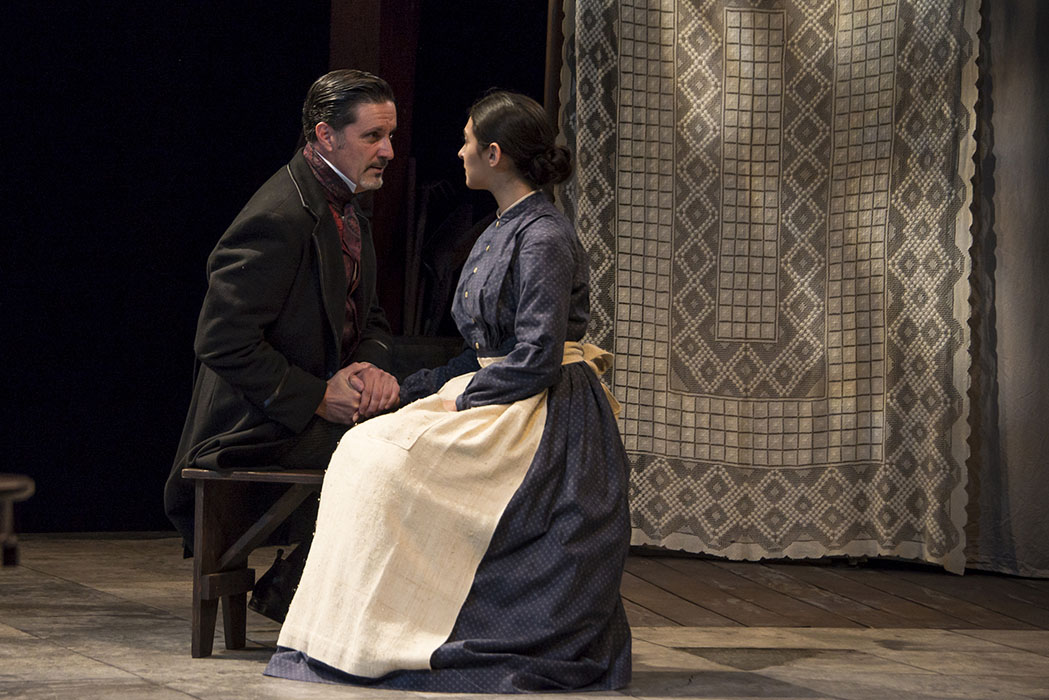It is a bit unfortunate that it takes TV adaptations of literary works to drive mainstream cultural recognition, but apparently that’s the world we live in. As a result, one would be hard pressed to be unaware of Margaret Atwood, the Canadian writer whose 1985 novel, The Handmaid’s Tale, was adapted into a major hit on the streaming service Hulu. But, admittedly, that adaptation’s themes of the oppression of women in a dystopian patriarchal society seemed to have touched a nerve at a time when nerves certainly need touching.
Atwood’s 1996 novel, Alias Grace, has received similar attention from filmmakers, becoming a mini-series that appeared on Canadian television last year, and subsequently on Netflix. In roughly the same time frame, a theatrical adaptation of the novel was being prepared by playwright Jennifer Blackmer, an adaptation that premiered at Ball State University in 2016 with a subsequent production at the Rivendell Theatre in Chicago last September. Both productions were directed by Karen Kessler who has also directed the Blackmer adaptation for the current Clarence Brown Theatre production of Alias Grace, now in a run at the CBT’s Carousel Theatre through October 14.
Atwood based her fictionalized tale on the real-life grisly murders of businessman Thomas Kinnear and his housekeeper/lover Nancy Montgomery in Ontario, Canada of 1843. Grace Marks, a sixteen-year old Irish immigrant housemaid of Kinnear, and James McDermott, his stable-hand, were convicted of the crime. McDermott was hanged; Marks was sentenced to life imprisonment.
Atwood’s fictional narrative begins some 15 years after the crime as Dr. Simon Jordan, a psychologist specializing in memory loss, has been hired by Mrs. Rachel Lavell, the socially active wife of the prison’s governor, to investigate Mark’s case and her claim of remembering nothing. For the flawed Jordan, it is a means to advance his professional ambitions of having his own asylum; for the demi-diabolical and manipulative Lavell (Katie Norwood Alley), it is one of many humanitarian causes she pursues as a means of forgetting her unhappy marriage.
Atwood and Blackmer touch on a number of thematic references throughout the play relating to the condition of women in society—mental illness, abortion, gender roles, poverty, status of immigrants, and fear of pregnancy—yet it is the examination of memory and truth that is at the relevant heart of the mystery of Alias Grace.
Through the construction of flashbacks in the “talk” sessions between Grace (Brenda Orellana) and Dr. Jordan (Brian Gligor), Grace’s memory is probed and revealed—at least to a point. Orellana painted a remarkably controlled portrait of Grace as an uneducated, but bright woman, a sympathetic victim of gender and class, who seems an unlikely murderess. Complete with a sweetly naive Irish accent, Orellana maintains the wall of character until the explosive transformative climax. Gligor’s Dr. Jordan, on the other hand, was called upon to carefully reveal an arc of character details as his time with Grace proceeds—his personal ethics, or lack of, his addiction to laudanum, and ultimately his hypocrisy. Oddly, one essential element of that arc—Jordan’s increasing attraction to Grace—seemed inadequately developed.

Through the flashbacks we also discover the other intersecting characters in Grace’s memory: her rakish employer, Thomas Kinnear (Collin Andrews), and his loose-cannon housekeeper and lover, Nancy ( played deliciously by Emily Helton); Grace’s friend and fellow servant, Mary Whitney ( a beautifully energetic Emily Cullum); the stablehand, James McDermott (Brady Moldrup); and the ambiguous peddler/illusionist, Jeremiah, played with an entertaining layered complexity by Tim Decker.
Throughout, set designer Becca Johnson’s thrust arrangement suggestive of stone and wooden floor boards is the site of laundry and quilts being folded and stacked, unstacked and refolded, by the women servants. This visual metaphor was carried over into the set’s backing of hanging sheets and quilts—both translucent and opaque, both patterned and plain—but oddly missing a darkness, a wall of mystery to be penetrated.
Lighting designer Jordan Vera supported Johnson’s visual scheme, opting for a kinetic mixing of organic colors, sans mysterious darkness. Erin Reed’s costumes were broadly descriptive of the character’s apparent self-perceptions.
Director Kessler has taken Atwood and Blackmer’s work and woven a compelling tale—beautifully performed—in which a mystery is revealed layer by complex layer. But is this more than just a whodunit? Was Grace Marks guilty of a crime or a victim of mental illness and abuse? And can we learn the lessons presented? Successful theatre always asks more questions than it answers as it delves deeply into the human condition—in this case, you’ll be happy with that conclusion.
—With Brenda Orellana, Brian Gligor, Katie Norwood Alley, Emily Cullum, Emily Helton, Tim Decker, Collin Andrews, Brady Moldrup
Clarence Brown Theatre – Carousel Theatre
Through October 14
Tickets and Information








